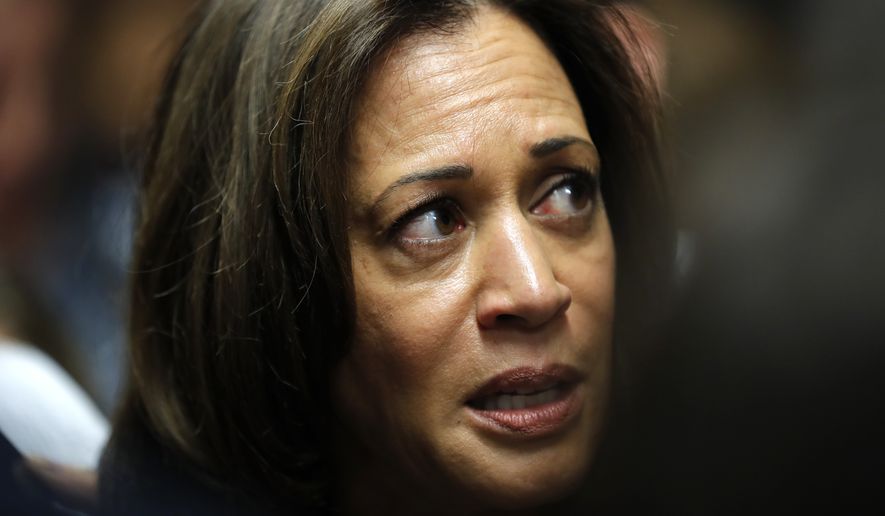The Trump administration is now on the clock to finalize one of the biggest changes to legal immigration policy in a generation, after the official comment period ended Monday on a plan to require immigrants to show they aren’t a public burden if they want to extend their visas or get on the path to citizenship.
Immigrant rights groups and other Trump opponents mounted a feverish last-minute push to try to derail the proposal. They submitted tens of thousands of comments calling the plan misguided and racist and warned that it would keep needy immigrants from visiting doctors and leave children hungry because their parents fear signing them up for free school lunches, lest they lose their chance at citizenship.
The president’s backers said they expect Mr. Trump and his team to finalize the proposal. If anything, they said, it doesn’t go far enough to crack down on what appears to be rampant welfare use by noncitizens and their children.
“I think they’re going to implement them as is or with some tweaks. This is the kind of thing he was elected for,” said Steven A. Camarota, research director at the Center for Immigration Studies. “While there might be advocacy groups that object to that idea, the fact is most Americans think immigrants should be self-sufficient, so I think they’re on pretty strong ground.”
The center released a study this month calculating that a staggering 63 percent of households led by noncitizens use at least one welfare program. The rate for households led by native-born Americans is just 35 percent.
But under guidelines established during the Clinton administration, the government looks at only a narrow set of cash assistance programs when determining whether an immigrant is a public charge.
Even then, it was rarely enforced.
The Washington Times reported in 2016 that of five major countries for immigration to the U.S., just three people were cited for being public charges in the years from 2013 to 2015. Immigration judges sustained just one of those cases.
The Homeland Security Department’s proposal would add food stamps, public housing and long-term institutionalized care to the list of potential public charge grounds. Disaster relief, assistance to immigrants serving in the armed forces or their families, and emergency medical care would not count against an immigrant.
The changes would save the government nearly $20 billion over the next decade, the administration calculated, based on immigrants it says would shy away from claiming benefits for fear of poisoning their future status.
Rights groups said that was a cruel choice to force on immigrants.
Sen. Kamala D. Harris and Rep. Nanette Diaz Barragan, both California Democrats, submitted official comments last week calling the proposal “extreme federal overreach.”
“By proposing a rule that so clearly attacks immigrant families and children, and which has already fueled fear and confusion in our communities, the department is taking another misguided step in advancing this administration’s cruel, anti-immigrant agenda,” they wrote.
The Evangelical Immigration Table, a coalition of Christian advocates, predicted that some married couples could suffer. One of the spouses could be denied a visa because of their poor financial position, and families with one parent who stays home to watch children could be burdened by having a lower income, the coalition said.
“Policies that separate or bar the reunification of families are deeply troubling,” the group said. “We believe that all government policy — including immigration policy — should promote the strength and unity of families wherever possible.”
The Department of Homeland Security proposed the public charge rule in October. As of Monday morning, more than 180,000 comments had been submitted. The vast majority were from opponents who blasted the overall direction of the proposal and called for it to be dropped, rather than offering suggestions for tweaks.
Homeland Security officials didn’t respond to questions about the department’s plans or when a final rule might be issued.
In its official filing, the department estimated that about 20 percent of noncitizens receive food stamps or public housing assistance.
Mr. Camarota’s 63 percent figure includes other programs such as tax credits or nutrition assistance under the Women, Infants and Children program, and includes households where the children, who often are citizens, receive benefits such as Medicaid.
Those would not be targeted by the rule, nor would American parents who adopt special-needs children from overseas and apply for Medicaid benefits to help with their care.
Military families also would not be penalized for using services.
Immigrant rights and public health advocates said they have seen a “chilling effect.”
“For many months, practitioners have seen patients forgoing vital services to keep themselves and their children healthy out of fear that using such programs jeopardizes their chance of getting a visa or green card,” Dr. Laura Hart said in a comment submitted Monday. “Children need healthy food and vaccines to be well in childhood so that they can be productive as adults. We should be removing the barriers that prevent them from accessing these important building blocks to their development, not adding to them.”
Mr. Camarota said early data suggest that fewer U.S. citizen children of noncitizen parents were signing up for Medicaid but there also has been an increase in the number with private insurance.
He said it appears immigrants are moving to take care of their own needs rather than turning to the government for assistance.
“That is good news,” he said. “It looks like the number of children of noncitizens are signing up at lower rates, but it’s not causing an increase in non-insurance.”
• Stephen Dinan can be reached at sdinan@washingtontimes.com.




Please read our comment policy before commenting.